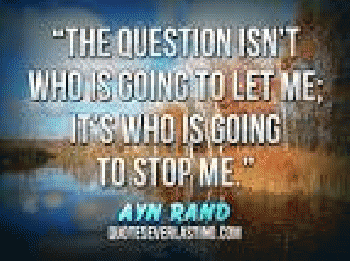From Robert Reich Blog
Donald Trump once said he identified with Ayn Rand's character Howard Roark in "The Fountainhead," an architect so upset that a housing project he designed didn't meet specifications, he had it dynamited.
Others in Trump's circle were influenced by Rand. "Atlas Shrugged" was said to be the favorite book of Rex Tillerson, Trump's secretary of state. Rand also had a major influence on Mike Pompeo, Trump's CIA chief. Trump's first nominee for Secretary of Labor, Andrew Puzder, said he spent much of his free time reading Rand.
The Republican leader of the House of Representatives, Paul Ryan, required his staff to read Rand.
Uber's founder and former CEO, Travis Kalanick, has described himself as a Rand follower. Before he was sacked, he applied many of her ideas to Uber's code of values, and even used the cover art for Rand's book "The Fountainhead" as his Twitter avatar.
Who is Ayn Rand and why does she matter? Ayn Rand -- best known for two highly-popular novels still widely read today -- "The Fountainhead," published in 1943, and "Atlas Shrugged," in 1957 -- didn't believe there was a common good. She wrote that selfishness is a virtue, and altruism is an evil that destroys nations.
When Rand offered these ideas they seemed quaint if not far-fetched. Anyone who lived through the prior half century witnessed our interdependence, through depression and war.
After the war we used our seemingly boundless prosperity to finance all sorts of public goods -- schools and universities, a national highway system, and healthcare for the aged and poor (Medicare and Medicaid). We rebuilt war-torn Europe. We sought to guarantee the civil rights and voting rights of African-Americans. We opened doors of opportunity to women. Of course there was a common good. We were living it.
But then, starting in the late 1970s, Rand's views gained ground. She became the intellectual godmother of modern-day American conservatism.
This utter selfishness, this contempt for the public, this win-at-any-cost mentality is eroding American life.
Without adherence to a set of common notions about right and wrong, we're living in a jungle where only the strongest, cleverest, and most unscrupulous get ahead, and where everyone must be wary in order to survive. This is not a society. It's not even a civilization, because there's no civility at its core. It's a disaster.
In other words, we have to understand who Ayn Rand is so we can reject her philosophy and dedicate ourselves to rebuilding the common good.
The idea of the common good was once widely understood and accepted in America. After all, the U.S. Constitution was designed for "We the people" seeking to "promote the general welfare" -- not for "me the selfish jerk seeking as much wealth and power as possible."
Yet today you find growing evidence of its loss -- CEOs who gouge their customers, loot their corporations and defraud investors. Lawyers and accountants who look the other way when corporate clients play fast and loose, who even collude with them to skirt the law.
(Note: You can view every article as one long page if you sign up as an Advocate Member, or higher).






